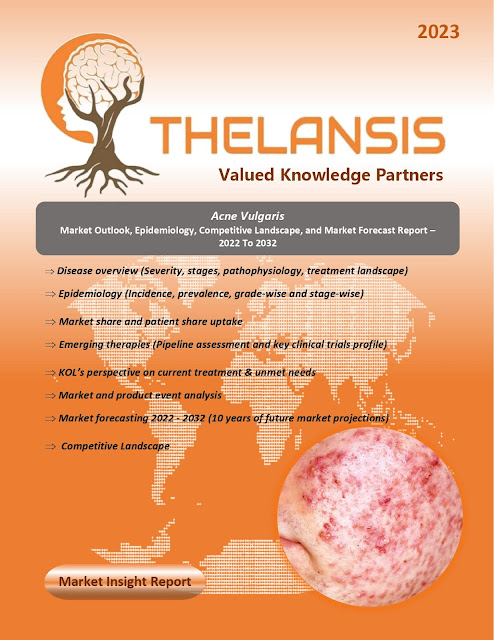Geographic Atrophy (GA) – Market Outlook, Epidemiology, Competitive Landscape, and Market Forecast Report – 2023 To 2033
Geographic atrophy (GA) marks the advanced stage of the dry variant of age-related macular degeneration (AMD). Some individuals with AMD may develop GA, characterized by the deterioration and death of cells in specific regions of the retina. The border of GA signifies the endpoint of continuous retinal pigment epithelium (RPE), with an internal absence of RPE cells, although a few are scattered within the GA area. Initial manifestations of AMD include drusen and irregularities in the retinal pigment epithelium (RPE). This early stage, known as age-related maculopathy (ARM), may progress to GA or exudative AMD. Around 11% of atrophic AMD, patients transition to the exudative form after four years. Choroidal neovascularization (CNV) in some eyes can also lead to GA. The intricate pathophysiology of GA involves chronic inflammation from an overactivated complement system, resulting in the loss of photoreceptors, RPE, and the underlying choriocapillaris. The disappearance of these structures manifests as well-defined atrophic lesions characteristic of GA. Diagnosis relies on visual function tests for assessing impairments and imaging tests for identifying clinical features, as there are no laboratory or genetic tests for GA. Historically, no treatment existed for GA until the recent FDA approval of intravitreal pegcetacoplan for GA secondary to AMD. Given the irreversible nature of vision loss in GA, treatment aims to decelerate lesion growth. Ongoing research focuses on potential drugs to slow lesion growth and preserve retinal tissue in the long term.
·
In the United States, GA prevalence is 3.5% in
individuals aged over 65, constituting approximately half the prevalence of
exudative AMD.
Thelansis’s
“Geographic Atrophy (GA) Market Outlook, Epidemiology, Competitive Landscape,
and Market Forecast Report – 2023 To 2033" covers disease overview,
epidemiology, drug utilization, prescription share analysis, competitive
landscape, clinical practice, regulatory landscape, patient share, market
uptake, market forecast, and key market insights under the potential Geographic
Atrophy (GA) treatment modalities options for eight major markets (USA,
Germany, France, Italy, Spain, UK, Japan, and China).
KOLs insights of Geographic Atrophy
(GA) across 8 MM market from the centre of Excellence/ Public/ Private
hospitals participated in the study. Insights around current treatment
landscape, epidemiology, clinical characteristics, future treatment paradigm,
and Unmet needs.
Geographic
Atrophy (GA) Market Forecast Patient Based Forecast Model (MS. Excel Based
Automated Dashboard), which Data Inputs with sourcing, Market Event, and
Product Event, Country specific Forecast Model, Market uptake and patient share
uptake, Attribute Analysis, Analog Analysis, Disease burden, and pricing
scenario, Summary, and Insights.
Thelansis Competitive Intelligence (CI) practice
has been established based on a deep understanding of the pharma/biotech
business environment to provide an optimized support system to all levels of
the decision-making process. It enables business leaders in forward-thinking
and proactive decision-making. Thelansis supports scientific and commercial
teams in seamless CI support by creating an AI/ ML-based technology-driven
platform that manages the data flow from primary and secondary sources.
Tags: Geographic
Atrophy (GA), Geographic Atrophy (GA) market outlook,
Geographic Atrophy (GA) competitive landscape,
Geographic Atrophy (GA) market forecast,
Thelansis, Primary market research, KOL insights, Competitive Intelligence (CI)




Comments
Post a Comment